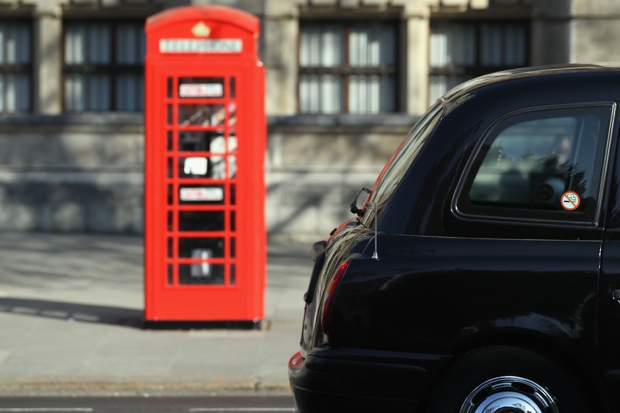I lost my misguided faith in black cabs last week, on the corner of Royal College Street in north London. It was the tiniest trip — 2.4 miles from Bloomsbury to my Camden flat at 11.30 in the evening. Hard to mess up, too: empty roads, good weather and the easiest of routes — practically a straight line to my flat. To my horror, the cabbie dodged the obvious, straight route and embarked on an extended loop through the traffic-choked hub of Camden Town tube station and Camden Market.
I pointed him in the right direction and he reluctantly did a U-turn and headed up Royal College Street. Not a word of apology — and still a £11.20 fare for a ten-minute journey. No tip, needless to say.
I can’t know whether he was ripping me off or merely clueless. But either way, in the days of satnav, it’s staggeringly incompetent. And in the days of highly efficient taxi and minicab apps — like Uber, Addison Lee and Kabbee — it’s unforgiveable. The exclusive privileges given to black cabs must go.
Black cabs are the go-slow thugs of the road. Overpriced, selective in who they pick up, arrogant about their knowledge and the Knowledge, nasty to other drivers, homicidal to bicyclists, bullying to competitors, they crawl across our cities in a puffed-up bubble of self-importance that has needed pricking for years.
The myth that the Knowledge is some astounding feat of memory is no longer true, if it ever was. In 15 years, no black cab driver has ever known the quickest route to my flat. Yes, it’s impressive to learn 320 routes within a six-mile radius of Charing Cross. And cabbies were particularly gratified in 2000, when scientists at University College London discovered that black cab drivers often had an enlarged hippocampus — the part of the brain associated with navigation in birds and other animals. But none of that matters with modern technology. Google Maps and TomTom can even tell you where surprise traffic jams are. No hippocampus can do that.
There’s no justification left for a predominant, controlling group of cabs, with a monopoly on being hailed on the street or from airport taxi ranks. Access to the job is controlled through oral, one-on-one exams by PCO examiners, giving them a hugely subjective role in choosing who makes the grade. Throw in exclusive parking spaces for black cabs and the right to use bus lanes, and you have one of the last unreformed trades, with heavily restricted practices, in the country.
The moment any rival tries to open up the market, black cab drivers bring the capital to a halt. A few years ago, Westminster council decided, utterly reasonably, to set up a minicab rank off Leicester Square, from Thursday to Saturday, from 9 p.m. to 4 a.m. — when black cabs are inevitably in short supply. In response, a huge fleet of black cabs blocked the Mall for several hours and brought central London to a standstill.
With their exclusive rights protected by the Public Carriage Office, and their rivals held back, black cabs behave like any cartel — they squeeze their advantages for all their worth. On countless occasions, I’ve gone nuts at the little tricks drivers use to extend the journey time: gradually slowing down in approach to a green light, willing it to turn red; slowing down before a zebra crossing in the hope that a pedestrian will come along; moving off at the lights at a glacial pace; piling on infinitesimal fractions of seconds to the journey by taking a particularly wide arc into a corner; scrupulously staying out of yellow boxes painted over crossroads, apparently for Highway Code reasons, but really to catch another red light.
The list of offences goes on: refusing to take bikes because of their deep-seated hatred of bicyclists; playing Radio 5 Live at offensively loud volume; refusing to pick you up, even with their yellow light on, because they don’t like the look of you or because you’re on the wrong side of the street and they’re heading home in the other direction. If you want to see how fast black cabs can really go, watch one racing home for Match of the Day.
Worst of all is the price — they are the second most expensive taxis in the world after Tokyo. The official Public Carriage Office tariff is up to £8.40 for a mile, and up to £33 for six miles, but they acknowledge those figures rise with heavy traffic or delays.
My disastrous journey last week came in at £4.67 a mile. My regular train journey from London to Pembroke costs £20 for the cheapest single, £135.50 for the most expensive — that’s from 8.3p a mile to 56p a mile. The cheapest return flight from London to Rome on BA is £115 — 1,143 miles at just over 10p a mile.
And as the fares soar, the traffic stays stationary. The average pace of central London traffic in 2012 — 8.98 mph — is the same as it was 125 years ago, when hansom cabs were ferrying Sherlock Holmes to and from 221b Baker Street.
Gone, too, is the black cab driver’s supposed reputation for safety. That went, thanks to John Worboys, the porn star and stripper turned black cabbie, convicted in 2009 of drugging and sexually assaulting 12 women.
And then there’s the plain, surly aggression of some black cab drivers. A few years ago, a cabbie in St James’s Square threatened me after he wrongly accused me of letting my parked bike fall over and hit his cab. ‘I’ve got a good eye for faces and I’ll get you,’ he barked, jabbing his finger a foot from my nose, ‘I can make you disappear.’
He was some way from being the best cab driver in St James’s Square, let alone the world. Give me a minicab driver with a satnav and rock-bottom fares any time.






Comments